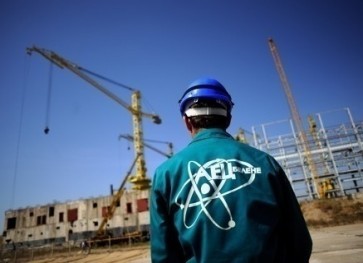BULGARIA ANGLES FOR RUSSIAN FUNDING OF NUCLEAR PROJECT
British bank HSBC, consultant of Belene nuclear project, has started working on an assignment for attracting financing by Russia's Rosatom, Bulgaria's energy holding announced.
Moscow has been approaching Sofia a few times with offers to finance part of thenuclear power plant project on the Danube River, but they all have been rejected.
Up to the end of March 2012 HSBC is expected to come up with clear parameters for financing the project, research the market, approach potential strategic investors and launch negotiations.
Bulgaria and Russia reached an agreement to extend the negotiations over Belenenuclear project by another six months as of the beginning of October amidst continuing haggling over its price and feasibility.
Bulgaria's National Electric Company NEK and Russia's Atomstroyexport, a subsidiary of Rosatom, signed on September 30 a new annex extending by the end of March 2012 their contract for the construction of two 1,000 megawatt nuclearreactors at Belene.
The new, fourteenth, annex between the two sides will allow them to take into account the results from the stress tests and the expected developments on the electricity market.
Bulgaria's Economy Minister Traicho Traikov recently commented that the project's consultant HSBC has already come up with its first conclusions, which show that there are ways to make Belene profitable.
Traikov however stressed that the line between "profitable" and "unprofitable" is very thin and a matter of detailed negotiations.
Bulgaria and Russia are unable to agree on the major bone of contention - the price for the construction of the 2000-MW Belene NPP.
Russia says the project construction price should be EUR 6.3 B. The Borisov government wants to set the price at as little as EUR 5 B.
After it was first started in the 1980s, the construction of Bulgaria's second nuclearpower plant at Belene on the Danube was stopped in the early 1990s over lack of money and environmental protests.
After selecting the Russian company Atomstroyexport, a subsidiary of Rosatom, to build a two 1000-MW reactors at Belene and signing a deal for the construction, allegedly for the price of EUR 3.997 B, with the Russians during Putin's visit to Sofiain January 2008, in September 2008, former Prime Minister Stanishev gave a formal restart of the building of Belene. At the end of 2008, German energy giant RWEwas selected as a strategic foreign investor for the plant.
The Belene NPP was de facto frozen in the fall of 2009 when the previously selected strategic investor, the German company RWE, which was supposed to provide EUR 2 B in exchange for a 49% stake, pulled out.






